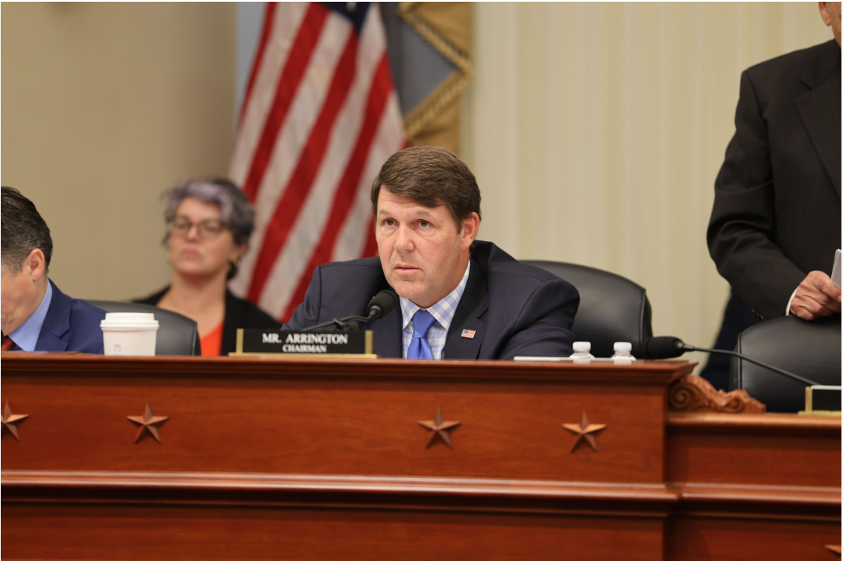Chairman Arrington Delivers Opening Remarks at Markup of Congressional Budget Office Reform Bills
WASHINGTON, D.C. – Today, House Budget Committee Chairman Jodey Arrington (R-TX) delivered opening remarks at the markup of six bills that aim to improve the Congressional Budget Office (CBO).
Those bills are:
- H.R. 9716, the “Increasing Baseline Updates Act”
- H.R. 9751, the “Executive Action Cost Transparency Act”
- H.R. 9714, the “CBO Oversight Act”
- H.R. 9711, the “Congressional Budget Office Scheduling Reform Act”
- H.R. 8068, the “Stop the Baseline Bloat Act of 2024”
- H.R. 9686, the "HEALTH Panel Act"

Click HERE to watch Chairman Arrington’s Opening Remarks
Opening Statement as Delivered:
“The Budget Act was created 50 years ago this year. There’s only been four times when we've ever done all 12 appropriations bills and a budget in those 50 years. We don't pass budgets on time. We don't consider budgets. We don't debate them like we should. We don't implement them like we should. We don't offset costs. It's not just Republican dysfunction. It's Democrat and Republican dysfunction.
My Democrat colleagues came up with a great idea in 2010 statutory PAYGO and it said if we spend on mandatory spending above and beyond the baseline, we have to offset it on either side, whether it's tax or spending. Since 2010, we haven't enforced statutory PAYGO, not one year. We have failed to offset $12 trillion. We’ve got to make some changes, and we've got to find agreement where we can to change it.
We owe it to the American people to do the right thing by the People's Government and stewardship of their resources. We owe it to them to work together when we can to make this process function efficiently – where they are providing this critical information on scoring bills, at looking at a 10-year outlook, and projecting economic conditions so we can do the cost-benefit analysis on the policies that we are proposing to solve biggest problems facing our great country.
This is not a partisan exercise. I appreciate my ranking member who’s leaned into working with me when he can. When we have disagreements, we do that respectfully, and I appreciate that. A new day has dawned in the budget committee, and we're going to have vehement disagreements, and we're going to have an impassioned debate. We have been more collegial, and we have done more intentional work to find bipartisan common ground than past budget committees.
Since the 1974 Budget Act, we've passed 10 process reforms out of 11 on a bipartisan basis, and the first unanimously supported bipartisan budget reform in the House and Senate that the President will soon sign and become law. That’s progress right there. We've talked about a bipartisan fiscal commission. Scott Peters is a leader on that. I don't want to wait another 50 years to see if we can let this process yield solutions to the $127 trillion of additional unfunded liability in the future.
Mr. Peters said it himself, if we do nothing on Social Security, every Social Security beneficiary is going to take a 20 percent hit. Put spending, programmatic reforms, and pay fors on the table, because that's how we're going to end up solving that together. No party is unilaterally going to do it. No party has done it thus far. We need to get back to what Reagan and Tip O'Neill did on that. We’ve done some good things together and today's hearing on the six reform bills are in that same vein of common sense, straightforward solutions to governing and distorting taxpayer resources. I hope we can continue to work together and make progress.
I take this opportunity to address what I think is the biggest challenge facing this country, and that's the unsustainable fiscal path we're on. We have ideas on pro-growth tax policies. At the end of the day, the American people are going to vote for what they think is the best path for our country. What we have to agree no matter what direction we go, is that we're not going to defer the tax to our children, and we're not going to defer the bill and the cost of this government on our kids with the debt at 35 trillion and over WWII levels of indebtedness. We simply can't do it.”


